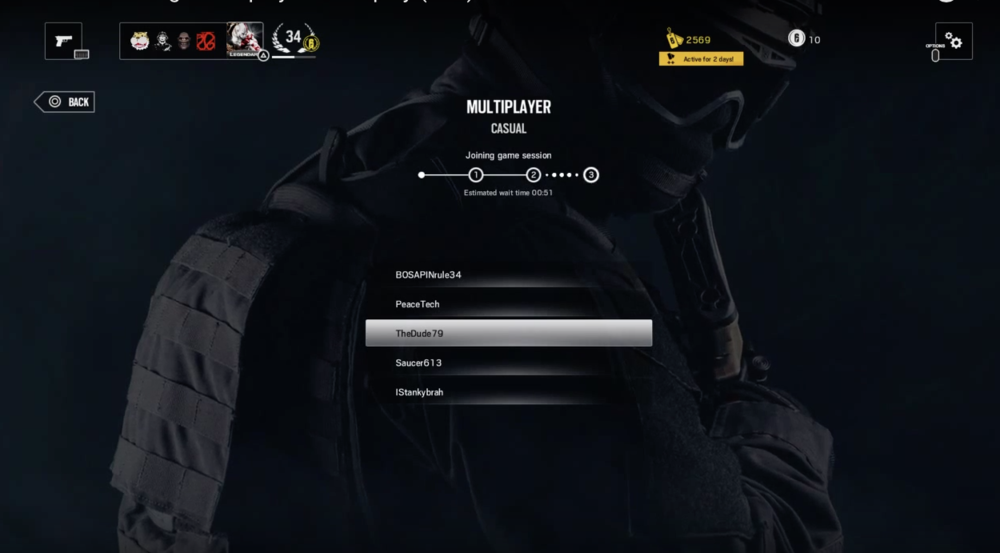On social gaming space and developer responsibility
An inquiry on the role and responsibility of game developers as creators of social space for players, particularly those of young age.

Whenever you walk into a multiplayer hub after a random matchmaking, you may have this reaction, as if you were watching a horror movie, anticipating the jumpscare that might or might not come after this moment of suspiciously quiet suspense. Will the Predator finally come out of the shadows to dramatically murder a generic marine?
But this is no monster you're half-expecting. It's the dreaded unpleasant, disrespectful, loud player that'll end up messing your match by constantly insulting everyone and acting like everything's everybody else's fault. We've all been there. We've all met or been that person, as we may begrudgingly admit.
While we can't pin everything bad that happens in a game on these loud types, they're certainly responsible for a lot of discomfort in our everyday online gaming. These agressive players show something to other gamers: that it's okay, to a certain extent, to be an asshole.
All that frustration, those negative feelings, they strongly affect everyone else by communicating that anger. We're all adults, of course, a considerable part of us can block those feelings and keep playing as if the Loud One's presence is just a bad moment to pass. It all works fine on paper. Except that we're not all adults.
Contrarily to twenty or thirty years ago, gaming is now a much more widespread activity, due to many factors (popularity of consoles, quality and accessibility of games and computers alike, etc). While many of us grew in a pre-2000 gaming era where online multiplayer games were scarce, it's not the case anymore. While prejudices have often left video games to be considered as a kid/teenager activity, the medium grew (arguably) more mature and is now undoubtedly full of quality games of all styles, for all ages.
Yet, video games are still games at their core for the most part, and who loves games more than the youth? With the rise of the F2P model with popular titles such as League of Legends, Smite or Warframe, our youngsters have an extensive list of excellent games easily accessible. These online games often have a major downside: they expose everyone to the toxicity of others, to the wonders (read: horrors) of the internet. I'm not mentioning internet here for nothing: anyone being born in the last few decades had to grow up in a world where internet is a normal thing. The vast majority of people under 40 right now have a very good understanding and a certain ease when it comes to surfing the perilous tides of the World Wide Web. But things tend to get nasty at some point, when you look at the behavior of a certain percentage of disturbingly loud people in forums and online communities. On a closely related subject, Luke Winkie says:
"Like PewDiePie, I'm someone who spent a lot of time in insular gamer bubbles growing up – I also became conversant in that lame, misogynistic humor during screaming Halo 2 deathmatches. But it was all played for laughs in my head. I was in on the joke. I didn't really mean it. The high was fun, but it never bled into how I felt or expressed myself in real life.As I got older, I eventually realized how vile some of those communities could be, but I was still somewhat sympathetic towards the other young boys on the internet. I was confident that, like me, they'd eventually grow out of it and rejoin civilized society. But in 2017, after the targeted harassment campaigns that characterize the worst parts of the GamerGate movement, Breitbart's designated "black-on-black violence" tag, and a ridiculous (and debunked) right wing conspiracy theory about a Democrat-funded pedophila ring, no one can claim that the sarcastic prejudices of young boys on the internet are harmless anymore – if they ever were in the first place. As kids, they were introduced to jokey right-wing extremism as a communal in-joke – a meme writ large – but some of them are actually growing up to become earnest fascist trolls."
It's definitely not to say that all unpleasant people you meet online are actively becoming fascist bigots, but they certainly leave a strong impression, and their presence being common in a lot of online communities, you can expect that kids and teenagers will most likely be exposed to all of this verbal filth before long. I hate it, there's no other way to say it: it's disgusting and disheartening. But as a game developer, you have a choice. You can decide that the internet will be what it's always been, and leave things as they are - after all, it's kind of none of your business what happens between the players. Maybe add an instaban tool for the douchebag who'll kill his teammates too often.

Or, you can decide to accept and embrace your role as a creator of meaningful, impactful content, and walk that extra mile that'd make your game's social environment better. Spend those extra weeks Q&A testing and making your profanity filter foolproof (the guys behind Marvel Heroes did a pretty solid job at that), use that extra portion of your budget buying that troublemaker-tracking algorithm - or whatever other measure that comes to mind. Be creative, don't let the bullies roam free. If we like when people speak quietly in a library for the sake of others' enjoyment and peace of mind, if we spend thousands in anti-bullying campaigns in high-schools, then it shouldn't be too much of a stretch to ask similar measured and civil behaviors from our players.
When I think of my time in college, I sometimes remember that conversation I had with a high school friend now completing her bachelor's degree in preschool education. She said that the pedagogic environment of her classes were, to put it mildly, batshit crazy. She felt like her classmates and her teachers were all on some really special drugs, dumbing down drugs. There was this general attitude of treating the BA students like babies, with arts & craft as mid and end semester projects (and not as preparation for working with toddlers, but with intentional - flimsy - pedagogic purposes). Somehow, a lot of people were fine with that. The girlfriend of my classmate back then was in a similar program focusing on kids with learning and adaptation difficulties, and she confirmed me the same thing was going on in her program. After speaking with a few teachers and students in these programs, I realized the people we send teaching our tiny humans are often wildly unqualified for that job.
Careful here: I'm not saying these people aren't motivated. They most certainly are, and the vast majority of them love children unconditionally. They go there with the best intentions in the world. But kids build up most of their vision of the world and their inner morals and understandings before the age of 10, which means that these 10 first years, the 5 last particularly, are probably the most important part of their education, and we're often leaving them in the hands of well-intentioned individuals that don't have a clue how vital their participation in the kids' lives is, and how dramatically everything they do will affect them. The job of preschool teacher is often done by great people without the proper training to mold these young people's minds adequately.
Let me give you a an example. Take my little cousin: about three years ago, second year of school after kindergarten, her teacher, who was fired a few weeks after repeated similar incidents, said to her in front of the whole class that there's something wrong with her not being able to solve the math problems given to her. I'm quoting here, she said "What is wrong with you?" as a figure of strong authority to a confused child. From this exact moment, my cousin started having massive anxiety problems everytime she struggled with school content, thinking very seriously that she was the stupid one whenever she didn't get something right. It's been three years, things haven't got a lot better since then and they probably won't.
It's not a common thing among preschool teachers to act like that, but the important thing here is not the teacher's behavior, but how the child reacted to her teacher. It's just an example of how malleable a young person is. In these ten extremely importants years in the life of an infant, video games too can act as a major vector of learning and understanding, many of us lived that firsthand. Don't forget that people don't become unbearable douchebags by magic, an angry personality in gaming can be enabled by the repetition and mimicry of others. A child's environment plays a huge part in why and how she act and think like she does.
As game developers, we're not able to oversee the education of every kid in the world (thank god), but we can make sure that we prepare the most suitable social environment possible for everyone. Now, that doesn't mean "stop making GTA games", we're leaving that sort of sensitive content's accessibility to the parent's discretion (also, they're fun games intended at parodies. Terribly sexist parodies, but good parodies nonetheless).
To make it simple, game developers have a slightly similar responsibility towards the players that primary school teachers do towards their students. We don't know who'll play what we make, but we absolutely do have a responsibility of showing what is or isn't acceptable in a social environment, online or not, and the way we enforce that aspect of our games will determine how players view online interactions.
The internet is no different that anywhere else - if you start yelling at a person in your classroom about how her mother's a REDACTED REDACTED of a REDACTED stupid REDACTED, not only are you likely to end up with her fist in your face, but probably that of other people around too. You don't do that in person because it's akin to being a dense, massive asshole, why the hell would it be any more acceptable online? Words hurt, written or said out loud.
Excuses have been made for not making monitoring and controlling more closely the behavior of players in online games, and to some extent it's understandable. It's not tempting when you make a game, if you need to spend half of the time you put on the game itself on trying to muzzle the people who'll play it, it's a lot of time, money and energy gone. Yet, with what we know nowadays, with the technologies at our disposition, we should think seriously about how we want to impact our players with the games we make. What gaming world do we want to live in? With who do we want to live in it? We have a chance at, and a responsibility in actively answering those questions.
Read more about:
BlogsAbout the Author(s)
You May Also Like













